
Christians at the truckers protest in Ottawa are praying for, and defying, Prime Minister Justin Trudeau; he invoked the Emergencies Act.
Like the Liberal government, the powers that be at CBC News haven’t taken much time to acquaint themselves with the Freedom Convoy people who have been occupying the centre of Ottawa.
But they’ve finally made an exception, finding quite a strong Christian presence in the encampment. On February 15, Jorge Barrera posted ‘For many inside the Freedom Convoy, faith fuels the resistance.’
It’s a good piece in many ways; he has taken the time to speak to several people who are indeed motivated by their Christian faith. They come across as fairly normal people with arguably legitimate concerns. And the presence of Christian themes at the impromptu community does seem significant.
He wrote:
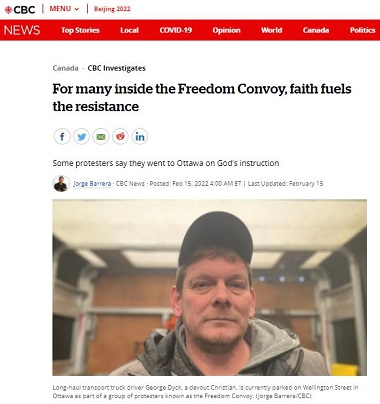 It’s unclear how many of the roughly 4,000 people who gathered in the Parliament precinct this past weekend call themselves Christians, but the biblical references were everywhere – in the hand-made placards lining the stone and iron fence at the border of Parliament Hill reading, “We are praying for Justin [Trudeau],” quoting parts of Psalm 23 or paraphrasing 1 Corinthians 1:27 in the New Testament. . . .
It’s unclear how many of the roughly 4,000 people who gathered in the Parliament precinct this past weekend call themselves Christians, but the biblical references were everywhere – in the hand-made placards lining the stone and iron fence at the border of Parliament Hill reading, “We are praying for Justin [Trudeau],” quoting parts of Psalm 23 or paraphrasing 1 Corinthians 1:27 in the New Testament. . . .
Christian sermons of varying lengths emanate regularly from the main flatbed stage on Wellington Street and from curbside preachers using microphones attached to portable speakers. Their words waft in the air and mix with the rumble of diesel engines and fumes, thumping dance music, the tinge of marijuana.
Starting Friday, ‘Jericho marches’ [involving 100 – 200 people] began circling the parliamentary precinct every morning. The name refers to the Old Testament story of the Israelites walking around the walls of Jericho for seven days. On the seventh day, the Israelites marched seven times, blew rams horns and shouted. The walls came tumbling down.
Unfortunately, Barrera intertwined his interviews and insights with the mainstay of CBC coverage – American influence, evangelicals (short-hand for right wing bigot in many quarters) and a video of weapons seizures in Alberta.
(‘What the Truckers Want’ – an article by Rupa Subramanya on Substack – is the kind of thing CBC News should have been doing all along.)
What do Christians think?
 That is a very tough question to answer; they are probably much like the rest of the Canadian population, given that well over half of Canadians say they are Christian.
That is a very tough question to answer; they are probably much like the rest of the Canadian population, given that well over half of Canadians say they are Christian.
The Angus Reid Institute’s February 14 opinion poll demonstrates the mood of the nation quite clearly: ‘Blockade Backlash: Three-in-four Canadians tell convoy protesters, ‘Go Home Now.’ And they’re happy to see force used in place of negotiation.
However, “criticism abounds for police and politicians” . . . Canadians are most critical of Trudeau: two-thirds (65%) say he has hurt the situation, three times as many who say he has helped (20%).”
I do have the impression, both in person and online, that many Christians feel some real sympathy for the protestors. There are many reasons for that identification, and here a few – not all related to matters of faith – that immediately leap to mind:
* The fact that the Liberals have pushed through policies which target, or at least harm, Christians and their beliefs, relating to such issues as Canada Summer Jobs restrictions, abortion, euthanasia and Bill C-4.
* The Prime Minister’s inflammatory language about people who oppose vaccine mandates;
* The inconsistency of government practice – and media reporting – of various protests.
Local Catholic writer/editor Paul Schratz is one of several local religious leaders who is sympathetic to the truckers and the Freedom Convoy; he does a good job of keeping an eye of developments.
Early in the truckers protest he wrote ‘No place for divide and conquer in Canada. Here was his conclusion:
[Truck drivers] have a right to be treated better by their prime minister. So do Canadians who have sacrificed much in trusting the political leaders they put in office. They’ve been failed not only by those leaders but by many of the country’s authorities and institutions. We’ve now seen the danger and consequences of putting absolute power in the hands of elected officials.

Gassy Jack was toppled by local protestors February 14.
Scripture teaches us to have respect for authority. Hebrews 13:17 says, “Have confidence in your leaders and submit to their authority, because they keep watch over you as those who must give an account.”
For two years Canadians have placed their confidence in their leaders and submitted to their authority, but now is the time for political leaders to give an account, at least from a constitutional perspective.
Schratz has since been active in retweeting, for example, that the Canadian Civil Liberties Association states that the Liberals have not met the threshold necessary to invoke the Emergencies Act, and that the “New York Times backs the truckers, says ‘allowing nonviolent protest is important in a polarized society’ and reminds Trudeau that he supported farmers blocking highways in India for a full year.”
He also retweeted this comment by Aaron Gunn:
It’s actually hilarious how marauding left-wing mobs tear down statues and commit acts of vandalism with impunity, but Trudeau invokes the War Measures Act to deal with protesters who put a hat on Terry Fox’s head.
I suspect that a fair number of local Christians, including leaders, see things as Schratz does.
Official statements
The ecumenical networks, denominations and organizations appear to have a range of views. A few are vocally opposed to the occupation, while most seem to be keeping a low profile.
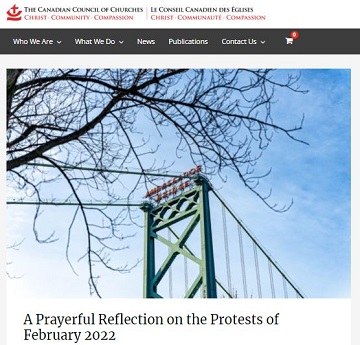 The Canadian Council of Churches, Canada’s largest ecumenical body, posted ‘A Prayerful Reflection on the Protests of February 2022.’ It took a stab at recognizing the impetus behind the Freedom Convoy:
The Canadian Council of Churches, Canada’s largest ecumenical body, posted ‘A Prayerful Reflection on the Protests of February 2022.’ It took a stab at recognizing the impetus behind the Freedom Convoy:
When we are weary, longing for renewed human connections, impatient to return to the way things used to be, struggling with what is becoming, let us not allow fear or suspicion to erode our hearts, hearths and communities, pulling us into isolation and distrust.
But mostly the statement adopted an admonitory tone:
We are deeply concerned that perceived freedom for some will have a negative effect on the freedom, health, and livelihoods of others, especially those who are vulnerable. Any society is best measured by how it prioritizes the health and well-being of vulnerable citizens and marginalized communities. . . .
At the same time, we must also speak out against the inappropriate and offensive presence of flags, slogans and imagery that has appeared at the protests.
When Christian and other religious imagery, words and organizations are associated with violence, a call to overthrow government and vulgar reproach for elected officials and citizens alike, we call on those who are Christians to stop and remember the witness and sacrificial love of Jesus. His life reminds us that worthwhile change comes through humble love of God and neighbour rather than force and coercion.
Go here for the full statement.
The Evangelical Fellowship of Canada (EFC) tweeted this prayer request February 8 (repeating it in a weekly update February 15):
As tensions continue to rise in Ottawa and in other cities and locations across Canada, let’s join together as Christians to pray for peace in our country; that civility and mutual respect will prevail, and for the safety of all. Pray that God will give leaders at every level wisdom and understanding, and that prudent decisions will be made for the public good of all Canadians.
The Canadian Council of Catholic Bishops (CCCB) doesn’t appear to have made any comment, though it is a member body of the Canadian Council of Churches.
Unjust labour policy
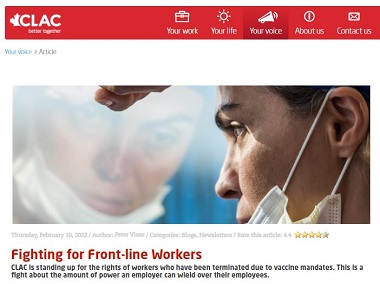 A lawyer working with the Christian Labour Association of Canada (CLAC) posted a comment February 10 (‘Fighting for Front-line Workers’), making a point that should have been more prominent in public discussions. He argued:
A lawyer working with the Christian Labour Association of Canada (CLAC) posted a comment February 10 (‘Fighting for Front-line Workers’), making a point that should have been more prominent in public discussions. He argued:
As a union, CLAC has been pushing back against employers from the very first policy that mandated vaccination as an ongoing condition of employment.
We have always encouraged our members to get the vaccine. We believe it is safe and effective at reducing severe illness and hospitalization, so it’s an important part of our collective effort to reduce the strain on hospitals and healthcare workers.
However, in light of evolving variants, waning vaccine efficacy, and the availability of reasonable alternatives such as rapid antigen testing, we do not believe that the workers who exercise their free will to not get the vaccine should pay the ultimate price for that decision by being terminated.
Go here for the full comment.
Considered opinions
A couple of Christian leaders I admire have stuck their necks out on the subject of the Freedom Convoy.
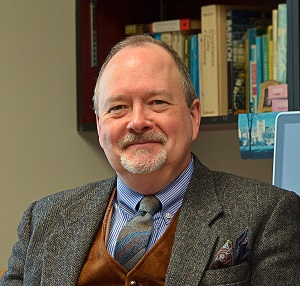
John Stackhouse
John G. Stackhouse, Jr., long-time professor at Regent College, now at Crandall University in Moncton, New Brunswick, wrote on ‘Civil Disobedience for Christians’ February 13. Here are portions of his piece, which should be read in context – go here:
I write reluctantly about a subject I have studied only occasionally over the years. But friends have asked me to address it – particularly friends in pastoral ministry whose churches in Canada, the United States, Australia and elsewhere are being riven by partisan politics – and so I’ll do what I can to help us think better about when Christians can and should defy the law.
1. The burden of proof is on the Christian who would disobey the law. To be clearer still, Christians are not free to disobey any law they find unjust, let alone any law with which they disagree. . . .
2. The measures taken must be proportionate to the expected outcome. And innocents must be spared. If instead the damage done by acts of civil disobedience outweigh the benefits gained, and particularly if people not implicated in the wrong to be righted are injured, those acts are not justifiable. It’s one thing to put oneself in harm’s way; it’s quite another to be blithe about “collateral damage.” Beware the easy rationalization of violent means to justify righteous ends, for thus has so much blood been spilled by every previous revolution. . . .
3. Christian thought leaders have recognized the danger in any resistance to authority: the danger of anarchy, which they generally viewed as always worse than the evil being resisted. . .
4. In the wake of the French Revolution and similar movements, many of Europe’s greatest minds have cautioned against mass civil disobedience and the quest for a quick, violent solution to entrenched problems. . . .
5. Finally, for governments to impinge on the freedom of a Christian citizen is bad. But that’s not the same as forbidding us to preach the gospel (per Acts 5:29, or the Barmen Declaration). Compromising our freedom to worship together as we like is not the same as forbidding us to preach the gospel (ditto). . . .
All these points are fleshed out in Stackhouse’s full comment; go here to read the full piece.

Ray Pennings
Ray Pennings, Executive Vice President and Co-Founder of Cardus, also wrote a persuasive comment, on Facebook February 15.
The decision by the federal government to invoke the Emergencies Act increases the pressures on all who have been participating in the Freedom Convoy, but particularly Christians. . . .
I have made my assessment of the ‘Freedom Convoy,’ seeking to apply these [preceding] principles. I can agree that what is being protested are unjust laws. I share the frustration that is expressing itself in political protest.
That’s not at issue. What is at issue is whether the case for either civil disobedience or overthrow of the tyrant has been made, and then if it has, how it is to be carried out.
But, and I have sought to raise these concerns as constructively as I can, the following conclusions come to mind.
1. The government is not so tyrannical that it needs to be overthrown through non-democratic means. Put in its historical context, I cannot agree that ours is the place or time for a revolution.
2. If the government is not tyrannical but the law is, then the Christian has the obligation to regard the government as holding office from God. Call attention to unjust laws, disobey, but respect the authorities and take the penalties without complaining (after all, for the ruler to punish the lawbreaker is for the ruler to do what is right in the sight of God. Not punishing lawbreakers is unjust and sin on the ruler’s part.)
It seems to me that this is the closest we can come to a biblical justification for the freedom convoy. That is the basis on which I have tried to support the convoy but raised my question or concerns.
For better or worse, recognizing that most of those who read my stuff are confessing Christians, I have sought to challenge those supporting the protest and civil disobedience (for which I concede a case can be made, even if I don’t agree) that civil disobedience takes place in a manner consistent with biblical principles rather than those of the French Revolution.
With respect, the main message proceeding from the freedom convoy is as I have heard it sounds more like the latter than the former (prayer services, hymn sings, and lots of good deeds notwithstanding.)
Go here for the full comment, and here for a similar Cardus comment.
Brighter days
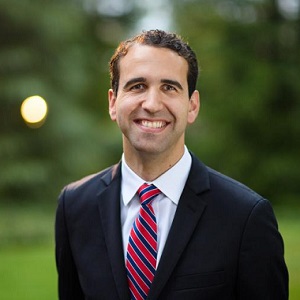
brianbird
Another wise commentator is Brian Bird, a Christian law professor at the Peter A. Allard School of Law at UBC. He posted ‘COVID-19 has frayed our social fabric, but brighter days lie ahead’ on The Hub February 16.
In part, he said:
Aspects of the commentary on the parked convoys and border blockades – activities that, in a country ruled by law, should either long be over by now or should have never occurred – have been a case study of this phenomenon.
The microscopic and selective focus by some on the worst elements of these protests is not accidental. The result is that many Canadians and observers abroad have been left with the false and toxic impression that many (if not most) of the protestors are fueled by racism, hatred and other odious beliefs.
The wreckage left by the pandemic in the public square and in our private lives could have been far less widespread had many politicians and governments chosen not to fan the flames of division and angst through careless rhetoric and senseless policy decisions, especially in recent weeks and months.
More contrition would have helped too. Rarely have we heard politicians or governments apologize for their errors or acknowledge their mistakes during the pandemic. Our public authorities have largely acted in good faith and with the best of intentions, but many moments along the way have called for a mea culpa. This factor alone has generated deep frustration for citizens across the political spectrum.
Many citizens, for their part, have allowed themselves to become entrenched in their pandemic opinions even when the evolving nature of the pandemic or the simple passage of time has proven them wrong. It has not helped that almost everyone has become an expert in epidemiology and public health since 2020. Humility has taken a backseat in these times. We could all use a booster of this virtue. . . .
Go here for the full comment.

Whether or not we agree with the truckers’ protest approach or purpose, it’s important to know that the mainstream media’s coverage, like everything else to do with the pandemic, is almost entirely one-sided.
As a trained journalist I have been increasingly shocked and concerned by this over the last two years. If you take for granted that the angle of stories and information given creates the full picture, take off your blinkers.
Sure, the protesters might not have the right approach, but they obviously feel it’s their only option. We need to think twice before judging. They remain because they have not felt heard by the current government. I don’t blame them for that.
They have been heard by everyone who is interested. The problem lays in their message. What they are saying is they will not stop until all of the mandates are removed. They lack understanding in political jurisdictions and proceed as though the PM is the type of dictator that they themselves want to install.
I am so tired of hearing the refrain’ that you cannot believe anything mainstream media says. It is all lies. Most journalists take pride in their jobs and work and try to do a good job in presenting unbiased reporting.
As in all things, they are certainly not perfect and make mistakes and have unconscious bias, but I have friends and acquaintances that dismiss everything that the mainstream media reports say as blatant lies. They are living in an alternate universe and spreading fear and outright lies about media.
Stackhouse’s piece has the best advice to Christians.
Christians who want to offer an argument in favour of these protests, should read John Stackhouse’s piece first. “God told me to” or “I felt I had to” or “it’s an infringement on my freedom” or “government control” or “the laws are unjust” doesn’t cut it as a reasoned Christian response.
Also, the plea that the “people are being ignored who suffer from fentanyl, suicides and crime” – true as this is – does not work as an argument for these protests, especially when the blockades cut people off from essential services and basic necessities. A person died because they couldn’t get through to get medical care in time. And blaring horns all night? Come on. You’re not winning anybody over. We have to do better, people.
Thanks for this important set of reflections, albeit, incomplete without taking more time for the original articles (appreciate the links, thus). I feel the editorial has flirted with skimming over some of the questionable motives, funding sources and alienating tactics (urinating, defacing, disrespecting Ottawa and other residents) of the so-called ‘Freedom Convoy.’
I would have appreciated more on the unavoidable tensions, which often break down even if they are known (and maybe practiced): especially, in terms of the principles of justice-making and keeping the sought out values of ‘freedom,’ ‘equality’ and ‘order.’
The vaccine protocols are an example of practising a hopefully just order with frank admissions that some will feel marginalized and extol or even absolutize freedom apart an extended exercise of responsible (never merely individual) freedom via public health orders and therein, hoped-for safety for even the vulnerable.
Yes?
In shalom